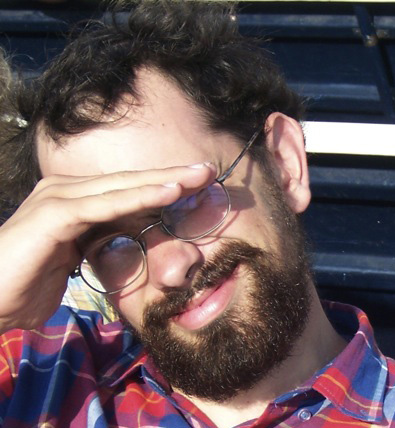Zerger
Que te vaya bien:
my permanent address
in a stand of bluestem
on pancake-flat ground
where the innocent farmer found
us naked.
My permanent address, the warm dent
in the bed where your head rests.
Twenty-one, all guns and chitter,
under vast and earnest skies,
there lies
my permanent address.
In winter wheat,
in milo. Where Parker Street
meets Chisholm Road.
Among the knobs on bony
feet, Que te vaya bien,
meaning I suppose
I grope hard at the ether
of ever after and all the while
storms prowl
echinacea skies, up gnarled
trees I flee,
through stubbly fields peach
pit in hand, at sixteen
I confiscate a caw
for ransom: Que te vaya bien.
Made of my mother’s maiden name,
at eight I tug her sleeve:
What part of me is me?
A sandbox? A swing
tied to a pine? Those
terrifying wind chimes?
A storm cuts to poorly-lit
skirmish scenes, twitching
strobe, it rolls its boulders:
a cannonade over ticking
derricks, miles of grain.
Wraith-filled, I’m born
bewildered on the western doorstep,
Que te vaya bien:
We carry the carol of death
always in our breast.
Farewell,
our permanent address.
Boils
Job, at his day job,
drafts maps of tourist traps,
of national parks,
of monument grounds,
counts on the sunset’s lessons
and later, television’s blessings
to preoccupy. No woman
waits for him at home. He shoos
black-feathered Eliphaz
from the window-ledge.
His eyes are blinking cursors.
His computer freezes, he curses.
He hears a boy with shears
shearing the shrubs outside
down to size. Job’s Kansas
hands pick, first at one, then
another, of his shoulder’s
clusters of pus-filled pockets,
each one brought on by lists
of unsatisfying myths, by routes
found out to go nowhere,
by glossy stacks of packets piled
on his desk, by the white-haired
earth, its iron gone weak, they say,
as straw, its bronze rotted impossibly
like wood. Job sniffs. Hears the click
of shears. The cough and gurgle
of a coffee maker. Job, for his maker,
once stood in the rain. These days
it is emails that nibble his brain.
Re: moundridge
j—my fault no front
porch, no beer each,
no
watching the silver streaks
of jets disappearing—
i’m holding. taped-up like
a letter. it’s the opening that cuts.
harvest just slammed us. june 5.
by july, fields here to hays
on fire. no late
summer burn this time.
sun to brand yr eyes
glancing west. dust-ridden
sunsets, alibis, goodbyes
are such blind spots.
when the green corner
of the john deere
met the metal frame
of the ford door
it made a call
like a hawk diving.
in a golden horn
the grain burst out,
crop lost
from the turkey creek forty
and that afternoon dad
kicked in the door,
straightaway up the stairs.
mud clumps
made a trail. i heard him
maybe throw something,
flop down for soaps
until chow time.
get this: my muzzle
drips. in dreams i’m one
in a pack of raccoons, purple
diamonds for eyes, we stagger
old ethnic roads
at the ends of our driveways
until nailed
by tractor-trailers or hail.
but this is boring, sentimental.
when i wake up,
it’s away to law school.
storms have been through
all of em gone off
as majestic as bombs,
just evidence left.
no anvil clouds now. no wind.
just bent stalks and dead crows.
if death mothers beauty
we’re an audience, sold out.
(i once watched dad drown
a litter of kittens he found
wriggling in the straw.)
mother’s made casserole.
a going away thing. eggplant, i think.
i won’t miss the whiff
of anhydrous ammonia…
i trade this
for socrates, certiorari,
habeas corpus, contortion
by torts.
i’m the sound
of an arm
caught in an auger.
yrs truly,
the kid
